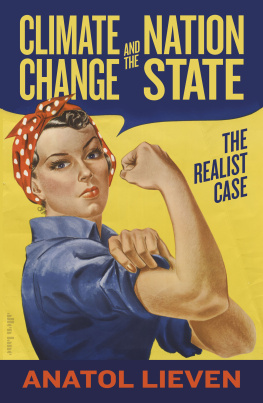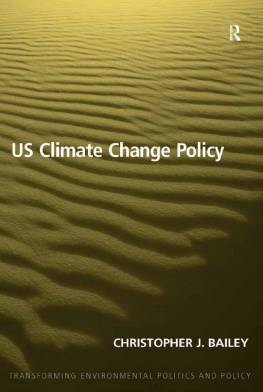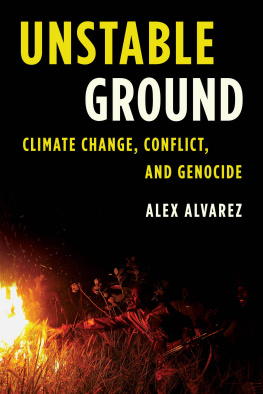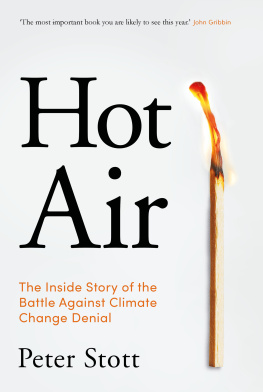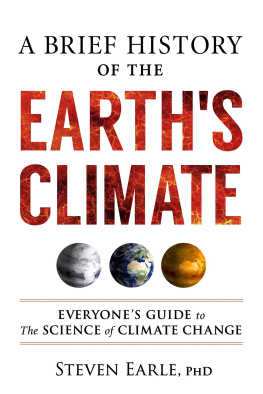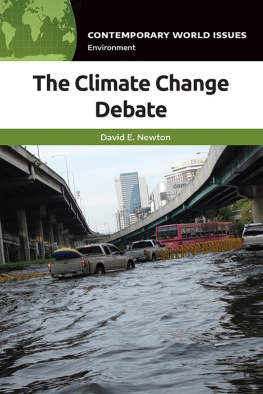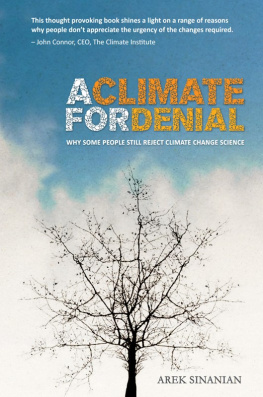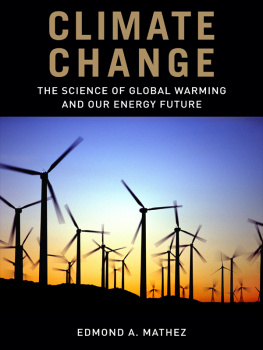Anatol Lieven
CLIMATE CHANGE AND THE NATION STATE
The Realist Case

PENGUIN BOOKS
UK | USA | Canada | Ireland | Australia
India | New Zealand | South Africa
Penguin Books is part of the Penguin Random House group of companies whose addresses can be found at global.penguinrandomhouse.com.

First published in the USA by Oxford University Press 2020
First published in Great Britain by Allen Lane 2020
Copyright Anatol Lieven, 2020
The moral right of the author has been asserted
Cover design by Richard Green
Cover artwork: Rosie the Riveter, c. 194243
Photograph from the National Archives, USA
ISBN: 978-0-241-39408-3
This ebook is copyright material and must not be copied, reproduced, transferred, distributed, leased, licensed or publicly performed or used in any way except as specifically permitted in writing by the publishers, as allowed under the terms and conditions under which it was purchased or as strictly permitted by applicable copyright law. Any unauthorized distribution or use of this text may be a direct infringement of the authors and publishers rights and those responsible may be liable in law accordingly.
For Katya, who will have to live with this mess.
But one of the first and most leading principles on which the commonwealth and the laws are consecrated, is lest the temporary possessors and life-renters in it, unmindful of what they have received from their ancestors, or of what is due to their posterity, should act as if they were the entire masters; that they should not think it amongst their rights to cut off the entail, or commit waste on the inheritance, by destroying at their pleasure the whole original fabric of their society.
Edmund Burke, Reflections on the Revolution in France, edited by Frank M. Turner (Yale University Press, New Haven CT 2003),
Acknowledgments

I should like to thank Simon Winder at Penguin and David McBride at Oxford University Press for their interest in my work over the years and their support for what initially seemed an unpopular and unfashionable project on climate change. Holly Mitchell and Jeremy Toynbee gave invaluable help with the editing process. I am also grateful to Natasha Fairweather, Matthew Marland, and their colleagues at Rogers, Coleridge and White for all their help. Katharine Danilowicz gave valuable assistance with the research. Michael Klare, Matthew Dal Santo, Ashraf Hayat, Andrew Holland, Michael Greco, Geoff Kemp, and Joshua Mitchell gave most kind and helpful advice on the book, but are not of course responsible for its contents.
Last I must thank my wife, Sasha, and our children, Misha and Katya. They are largely responsible for this book, since if they were not around, I would very probably have lapsed into paralyzed despair on the subject of climate change and the future of Western democracy; but no decent parent has that option.
Introduction

We are bound together in a single garment of destiny.
Martin Luther King Jr.
This book has its origins in a growing sense of alarm, of frustration, and of futility. As international efforts to reduce emissions have failed repeatedly to meet their targets, even as warnings by experts about the existential dangers of climate change and the need for haste have grown, I developed a stronger and stronger sense of the comparative irrelevance of most of the issues on which I have been working in the areas of international relations and security studies.
A revelatory moment came when I was researching the growing tension between the United States and China over the Chinese military occupation of reefs and sandbanks in the South China Sea. I suddenly realized that as a long-term issue these places will be meaningless for both sides: because if nations, and China and the United States above all, fail to take action to limit climate change, by the end of this century rising sea levels and intensified typhoons will have put the sources of these tensions under water again.
The rush of Western security establishments toward a new cold war with China and Russia (and new US threats of war with Iran) provided an additional impetus to write this book; for in all the innumerable articles and essays on this subject, hardly one has mentioned the destructive effects of hostility between China and the West on international co-operation against climate change.
In my approach to international relations I have always considered myself a realist, though one strongly influenced by the Christian Realist philosophy of Reinhold Niebuhr and the ethical dimensions of the works of Hans Morgenthau and George Kennan. As such, I have never believed in national power as an end in itself but only as a path to the achievement of greater goals, including universal human ones: defense of the Western democracies against serious threats to their security, but also international peace and cooperation through a recognition of the legitimate interests and the power of other states.
This book is therefore in part an appeal to my fellow realists, and to sensible and patriotic policymakers all over the world, to reassess the interests of their nations, in view of the overwhelming evidence for the severe danger posed to the future of those nations by anthropogenic climate change. It is true that climate change is a new issue for realistsbut then, it is a new issue for everybody, historically speaking.
Realists have always been chiefly concerned with state interests, and as this book will argue, the long-term interests of the worlds great powers are far more threatened by climate change than they are by each other. Realists claim to be concerned with reality, not with vague dreams of a perfect future. They ground their view of reality on a sober study of the evidence: on what is, not what ought to be. Moreover, of the cardinal virtues, the most important for realists are prudence and courageand if there was ever an issue that demands prudence in judgment and courage in action, it is climate change.
If intelligent realists do not wake up to the threat of climate change today, they will have no choice but to do so tomorrow, when it may be too late to prevent catastrophic results for their nations. This book is mainly directed at audiences in the Western democracies; but this part of it should appeal equally to patriotic elites in Beijing, Moscow, and Delhi. In democracies and especially the United States, strong public recognition by the military of the threat of climate change to the United States is of great importance because of the influence the military has over conservative audiences who are no longer willing to listen to civilian experts. As Nicholas Stern, the leading economist responsible for the British governments report on the economic consequences of climate change, has pointed out, Messengers matter. Different audiences trust different types of messenger . [C] limate change communication, to be effective, must utilise rhetoric and frames that resonate with the values and emotions that could inspire action.
Some militariesincluding intermittently that of the United Stateshave recognized the threat of climate change; but as will argue, to date they have paid it only a fraction of the attention that they have devoted to far lesser threats from China, Russia, and evenabsurdlyIran.

